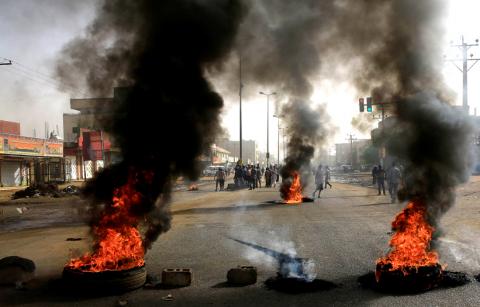Advertisement
Sudanese forces storm protest camp, nine people dead- medics
KHARTOUM (Reuters) - Security forces stormed a protest camp in the Sudanese capital Khartoum on Monday morning and at least nine people were reported killed in the worst violence since the overthrow of President Omar al-Bashir in April.
Footage broadcast by Al Hadath and Al Jazeera television showed chaotic scenes of people fleeing through streets as sustained bursts of gunfire crackled in the air. People rushed to carry away those who had been hit, the footage showed.
The main protest group accused the ruling military council of trying to break up the camp, calling the action "a massacre". The council said the security forces had targeted "unruly" groups in an adjacent area.
An alliance of protest and opposition groups said it was halting all contact with the military council. The two sides had been negotiating for weeks over who should govern in a transitional period following the overthrow of Bashir but the talks had become deadlocked.
The Transitional Military Council (TMC) had offered to let protesters form a government but insists on maintaining overall authority during an interim period. The demonstrators want civilians to run the transitional period and lead Sudan's 40 million people to democracy.
Thousands of young men and women have been taking turns to camp outside the Defence Ministry, the focal point of anti-government protests that started in December.
A group of doctors linked to the opposition said nine "martyrs" had been killed in Monday's violence and that the number of casualties was still rising.
"The protesters holding a sit-in in front of the army general command are facing a massacre in a treacherous attempt to disperse the protest," said the Sudanese Professionals Association, the group that has spearheaded protests since December.
It urged the Sudanese people to come to their aid.
The military council's spokesman, Lieutenant General Shams El Din Kabbashi, said the raid targeted criminals and that the protesters were safe.
"The protest camp has not been dispersed," Kabbashi said. "The security forces were trying to disperse unruly (elements) in the Colombia area, near the protest site, and some of these elements fled to the protest site and caused this chaos."
The council was still committed to a political settlement and was ready to resume talks on a civilian transition soon, Kabbashi added, speaking before the alliance called off the talks.
U.S., BRITISH CONCERN
The British Ambassador in Khartoum said he had heard heavy gunfire for more than an hour from his residence and he was extremely concerned.
"No excuse for any such attack. This. Must. Stop. Now," Ambassador Irfan Siddiq wrote on Twitter.
Alyson King, the British government spokeswoman for the Middle East and North Africa, said the international community would hold the military council responsible for the violence.
The U.S. Embassy in Khartoum also described the attack on the protest camp as "wrong" and said it must stop.
"Responsibility falls on the TMC. The TMC cannot responsibly lead the people of Sudan," the embassy said on its Twitter account.
The European Union called on the military leaders to allow people to protest peacefully and urged a speedy transfer of power to civilians.
STREET BARRICADES
Television footage showed black smoke rising from tents apparently torched by the raiding force.
Protesters poured into the streets in Khartoum and its twin city of Omdurman, on the opposite side of the River Nile, after news of the raid spread. Demonstrators blocked roads with rocks and burning tyres, witnesses said.
Demonstrators, some waving Sudanese flags, hurled stones at security forces, who charged amid sounds of intense gunfire.
A video posted on social media showed one protester collapse to the ground, crying in pain after being hit by what appeared as live fire.
A Reuters witness saw troops wielding batons, including riot police and members of the paramilitary Rapid Support Forces (RSF), deploy in central Khartoum and close roads, apparently to try to block people from reaching the protest site.
Bridges over the Nile have also been blocked.
The RSF is commanded by General Mohamed Hamdan Dagalo, the military council's deputy head. Dagalo, known as Hemedti, is a close ally of the United Arab Emirates and Saudi Arabia and sent Sudanese troop to join the coalition they lead in Yemen's civil war.
The UAE and Saudi Arabia believe political Islam is a existential threat and are eager to root out Islamists who dominated in Sudan under Bashir's three-decade rule.
The military's role in ousting Bashir has raised fears among many Sudanese that their country could follow a similar path to neighbouring Egypt after its 2011 uprising.
There, a military council oversaw a turbulent and sometimes violent transition before army chief Abdel Fattah al-Sisi led the overthrow of Egypt's first freely elected president, Mohamed Mursi. Sisi was elected president in 2014 and again in 2018 with 97 percent of the vote.
Under Bashir, a former general who was wanted by international prosecutors for alleged war crimes in the Darfur region, Sudan was on a U.S. list of sponsors of terrorism.
(Additional reporting by Ali Abdelaty and Omar Fahmy in Cairo, Writing by Sami Aboudi and Aidan Lewis, Editing by Angus MacSwan)



















Add new comment